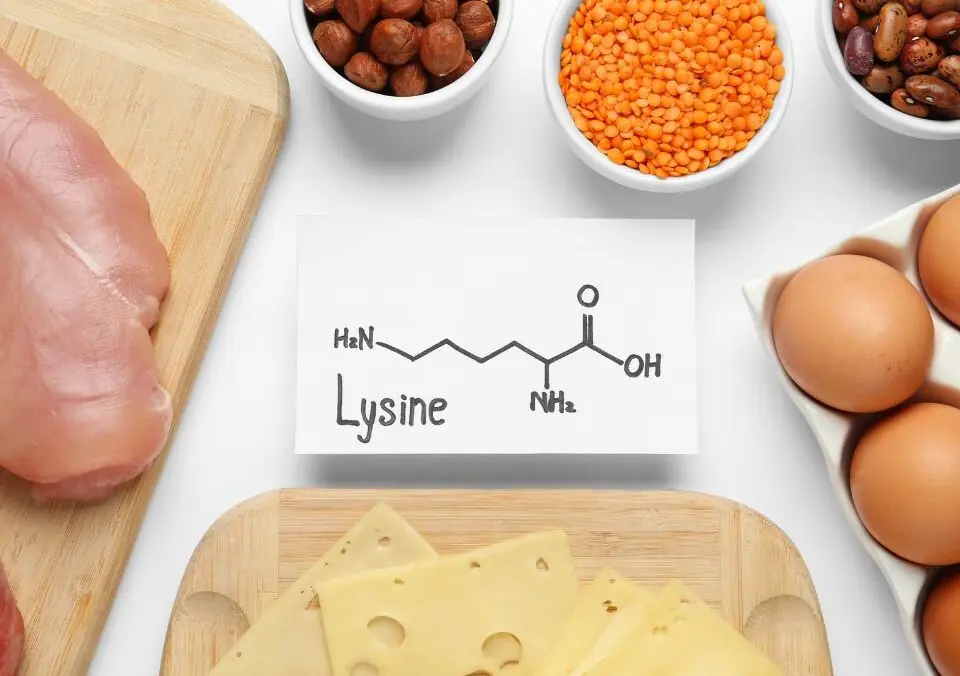Blog
Lysine is an Important Micronutrient

In the intricate tapestry of nutrition, we often hear about the significance of three primary macronutrients: fats, proteins, and carbohydrates. Each plays a role in sustaining energy levels and overall bodily functions. Yet, nestled within these macronutrients are the often-overlooked but equally crucial micronutrients, which are essential for optimal health. Among these micronutrients, amino acids, particularly lysine, stand out due to their critical roles in various physiological processes.
Understanding Amino Acids
Amino acids are organic compounds that serve as the building blocks of proteins. They play a vital role in numerous bodily functions, including the synthesis of hormones, neurotransmitters, and immune molecules. Overall, there are 20 amino acids that our bodies require. Out of these, 11 are classified as non-essential amino acids because our bodies can synthesize them. The remaining nine, known as essential amino acids, must be obtained from our diet.
Lysine, one of these essential amino acids, is particularly noteworthy for its multiple health benefits. Its importance extends beyond mere protein synthesis, involving many critical physiological functions that underscore why it deserves our attention.
The Importance of Lysine
Lysine, denoted as ‘Lys’ in shorthand notation, is essential for various bodily functions. Here are some key roles that highlight its significance:
- Bone Health: Lysine is essential for calcium absorption and plays a role in bone strength. It helps in the formation of collagen, a protein crucial for the development of connective tissues, such as cartilage and bone. Collagen also enhances the structure and strength of bones and contributes to their mineralization.
- Muscle Growth and Recovery: For those engaged in physical activities, lysine is critical to building and maintaining muscle mass. It aids protein synthesis, which is necessary for muscle repair and growth, making it especially important for athletes and active individuals.
- Immune Function: Lysine also supports the immune system by producing antibodies and hormones. It helps the body fight off infections, which is crucial for overall health and well-being.
- Hormonal Balance: The amino acid is involved in the production of several hormones, which can help regulate metabolism, growth, and reproductive functions.
Given these vital roles, ensuring adequate lysine intake is crucial for maintaining overall health and preventing potential deficiencies.

Dietary Sources of Lysine
Since the human body cannot synthesize lysine, it must be obtained from dietary sources. The following foods are rich in lysine:
- Animal Proteins: Meat, fish, and poultry are some of the best sources of lysine. Examples include chicken, turkey, beef, fish such as salmon and tuna, and pork. These are considered complete proteins, which means they contain all essential amino acids needed by the body.
- Dairy Products: Milk, cheese, and yogurt are excellent sources of lysine. These foods are not only rich in protein but also provide calcium and other vital nutrients necessary for overall health.
- Legumes: Beans, lentils, and peas are great plant-based sources of lysine. In addition to being rich in lysine, they also provide fiber and other essential nutrients. For further insights into the health benefits of legumes, check out the USA Dry Pea & Lentil Council.
- Nuts and Seeds: While nuts and seeds are generally lower in lysine than animal-derived foods, they still provide reasonable amounts. Almonds and pumpkin seeds are among the better options. Learn more about their health benefits from Nuts for Life.
- Grains: Quinoa and oats are special to note. Quinoa is a complete protein, offering all nine essential amino acids, making it an excellent choice for vegetarians and vegans. Similarly, oats provide a good amount of lysine compared to other grains.
- Spirulina: This blue-green algae is a superfood packed with nutrients, including lysine. It is often available in powder form and can be added to smoothies or foods. Visit Cleveland Clinic for a comprehensive breakdown of its nutritional profile.
Arizona Agriculture and Local Sources
In Arizona, agriculture plays a significant role in producing various lysine-rich foods. The state’s diverse climate allows for the cultivation of many nutritious crops, including several legumes, grains, and vegetables. By supporting local farmers and choosing seasonal produce, consumers can enjoy fresh, nutritious foods that provide ample lysine.
For those interested in knowing when and how to find locally grown and raised foods, the Fill Your Plate blog is an excellent resource. It offers valuable insights into Arizona’s agricultural landscape and guides consumers toward making healthier food choices.
Lysine Deficiency: Causes and Symptoms
Although lysine deficiency is relatively rare, certain groups of people, such as vegetarians, vegans, and those with specific dietary restrictions, may be at risk. Symptoms of lysine deficiency can manifest in various ways, including:
- Fatigue and low energy levels
- Poor appetite
- Slowed growth and development in children
- Weakened immune response, leading to increased susceptibility to infections
- Hair loss and dry skin
If you suspect a deficiency, it’s essential to consult a healthcare professional for guidance and dietary recommendations.
Supplementing with Lysine
While getting lysine through dietary sources is the best approach, some individuals may consider supplementation, particularly if their dietary intake is insufficient. Lysine supplements are available in various forms, including capsules and powders.
However, it’s crucial to consult with a healthcare provider before starting any supplement regimen. Excessive lysine intake, while rare, can potentially lead to gastrointestinal discomfort and other issues.
Summary
In summary, lysine is a vital essential amino acid that plays multiple roles in maintaining health and supporting bodily functions. From promoting bone health to enhancing muscle growth and supporting the immune system, its benefits are numerous. A balanced diet featuring high-quality animal and plant-based sources of lysine can help individuals meet their nutritional needs.
For those interested in exploring the world of lysine-rich foods, remember the significance of local agriculture, especially in regions like Arizona. Supporting local farmers and understanding the nutritional value of various foods can empower individuals to make healthier choices that align with their dietary needs.
By Heide Kennedy, Arizona Farm Bureau Communications Intern


















